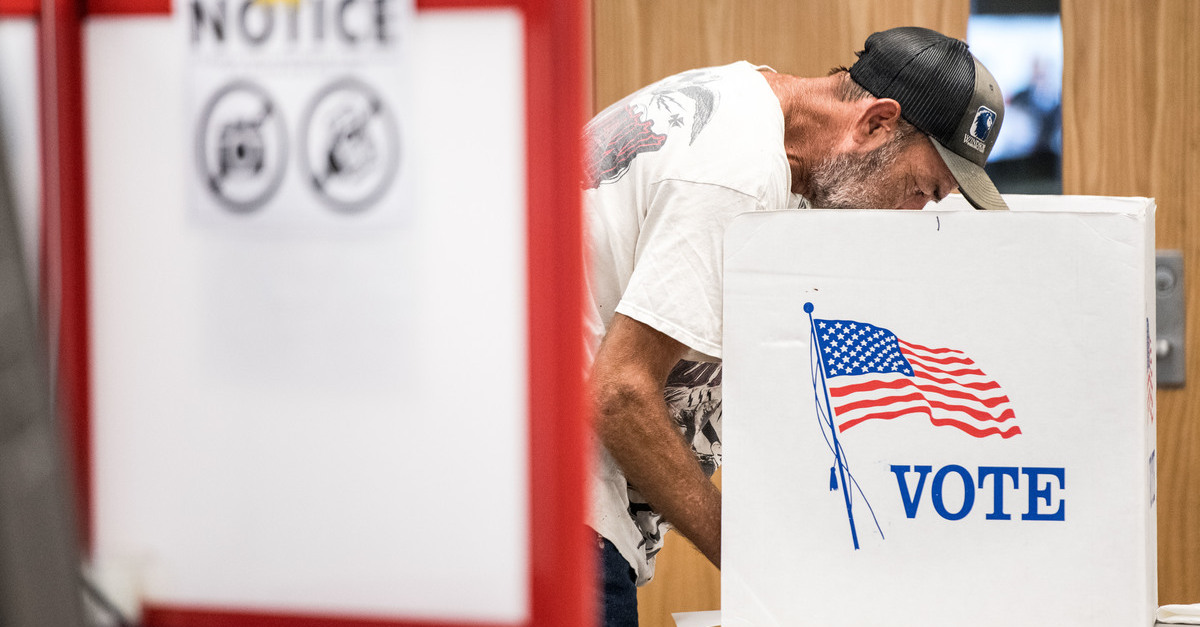
Tar Heels are being denied their constitutional right to vote by Republican legislators empowered through partisan gerrymanders, according to a lawsuit filed Monday by several organizations and entities aligned with the state and national Democratic Party.
The lawsuit targets North Carolina’s recently-passed early voting law, SB 325, which severely restricted early voting across the state by mandating so-called “uniformity” measures. Those measures, due to their price tag, effectively slashed the number of early voting sites and dates on which many counties offered early voting in 2018.
The GOP-enacted legislation also bans early voting on the last Saturday before Election Day–which is traditionally North Carolina’s busiest early voting day during any given election cycle.
In 2018, North Carolina’s GOP-dominated General Assembly passed the controversial voting rights restrictions contained in SB 325. Democratic Gov. Roy Cooper quickly vetoed the bill and Republican legislators then overrode his veto to codify the new barriers into law.
The last Saturday restrictions didn’t apply in 2018 due to a last-minute bit of legislative back-pedaling but will take effect just in time for the 2020 election barring any additional fixes to the state’s voting regime.
The lawsuit notes that such measures disproportionately impact two voting groups: African Americans and Democrats.
“African American North Carolinians in particular have cast their ballots during early voting at a higher rate than White North Carolinians,” the twenty-page complaint reads. “The same has generally held true for voters who are registered Democrats, as compared to non-Democrats. When these trends became apparent, Republican members of the North Carolina General Assembly repeatedly set their sights on reducing and restricting early voting opportunities for North Carolinians, targeting voters whom they perceive to hold unfavorable political views.”
Democrats argue that the GOP’s attempts to decrease voter turnout are both roundabout and deliberate.
The filing notes that “in 2016, early voting was again the most popular form of voting among North Carolinians, with over 60% of voters electing to cast their ballots during one of the 17 early voting days.”
“Yet, in spite of increasing numbers of North Carolinians who rely on early voting, the General Assembly Republican’s sustained attack continued,” the complaint continues, “instead of slashing the total number of early voting days, General Assembly Republicans crafted a bill to achieve the same ends indirectly.”
The lawsuit explains how the new law overburdens most North Carolina counties into cutting both voting sites and voting times:
SB 325’s uniformity provisions make it more expensive and inefficient or county boards of elections to expand or even maintain existing early voting opportunities by effectively stripping county boards of their discretion in determining when early voting sites should be open. … county boards are now required to follow a wasteful, one-size-fits-all mandate: if any one-stop early voting site is open on a weekday, all sites must be open from 7 a.m. to 7 p.n. on that weekday. This requires county boards to keep open early voting sites even during hours when few people tend to vote. Because SB 325 does not include any extra funding for this mandate, it has forced many counties to reduce the overall number of early voting sites in order to meet SB 325’s uniformity requirement.
Democrats also called foul on the GOP’s “legislative supermajority” because it “was entrenched through a partisan gerrymander eventually ruled unconstitutional.” After 2018, however, Republicans lost their supermajorities in both of the state’s legislative chambers.
The filing further accuses Republicans of violating the state’s constitution:
SB 325 unconstitutionally burdens North Carolinians’ right to vote, and none of the General Assembly’s pretextual justifications present interests sufficiently weighty to uphold the law. SB 325 also has the purpose and effect of making it more difficult for Democratic-affiliated voters, a group disfavored by General Assembly Republicans, to express their political will at the ballot box, and thus constitutes improper partisan retaliation against voters on the basis of their political affiliation. By limiting and restricting early voting opportunities and thereby disrupting the reasonable and settled expectations of North Carolina voters who have come to rely on early voting over the past two decades, SB 325 denies voters the rights guaranteed to them by the North Carolina constitution.
The petitioners are asking for a state court to rule the law unconstitutional and to bar it from being enforced.
Read the full filing below.
North Carolina Voting Right… by Law&Crime on Scribd
[image via Sean Rayford/Getty Images]